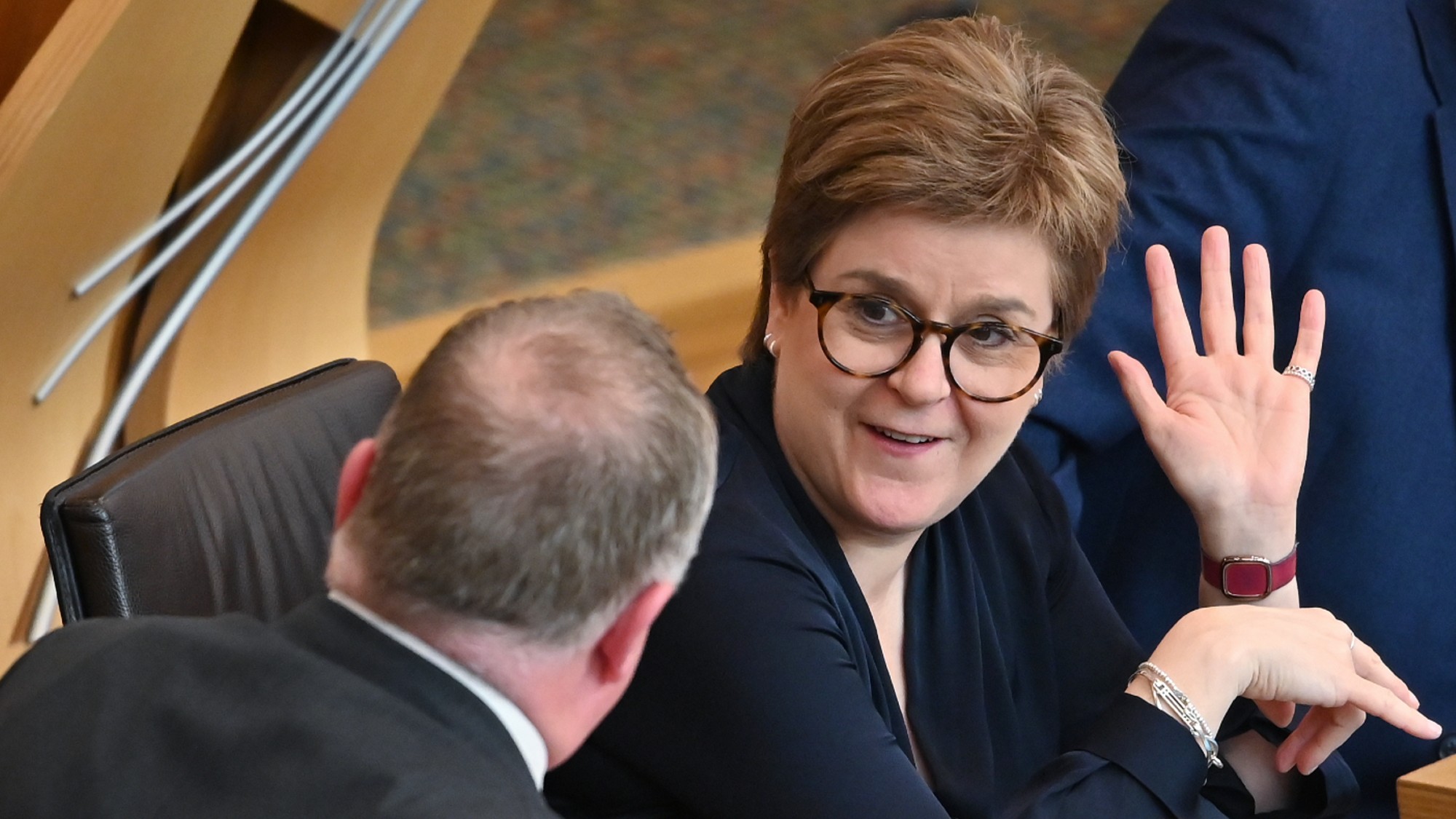Labour-SNP coalition adds up (if you ignore Trident issue)
Projection says this is the only pairing that can win a majority – but Labour won’t budge on Trident

A free daily email with the biggest news stories of the day – and the best features from TheWeek.com
You are now subscribed
Your newsletter sign-up was successful
Labour will not support the scrapping of Trident in order to form a coalition with the Scottish Nationalists, should they be the biggest party in a hung parliament on 8 May.
Ed Miliband’s campaign chief Douglas Alexander told Andrew Marr yesterday: “It’s the responsibility of a Labour government to keep this country safe.” As the likely Foreign Secretary if Labour win power, Alexander added: “Our position on Trident is clear and I’m not changing it.”
Alexander did not categorically rule out an election pact of some sort with the SNP. But abandoning the replacement of the nuclear deterrent would not be up for negotiation, he insisted, and nor would Sturgeon’s other demand – that Scotland be given full fiscal autonomy.
The Week
Escape your echo chamber. Get the facts behind the news, plus analysis from multiple perspectives.

Sign up for The Week's Free Newsletters
From our morning news briefing to a weekly Good News Newsletter, get the best of The Week delivered directly to your inbox.
From our morning news briefing to a weekly Good News Newsletter, get the best of The Week delivered directly to your inbox.
Alexander’s tough talk came as Electoral Calculus released a projection that a Labour-SNP pairing is the only combination of parties that would cross the threshold of 326 seats necessary for a Commons majority.
The projection is based on current polling averages which have the Conservatives and Labour neck and neck and the Lib Dems set to retain barely a third of the support they enjoyed in 2010.
According to the projection, Labour would have 297 MPs and the Tories only 265. The Lib Dems would shrink to 17 MPs and the Scottish Nationalists would jump from six to 47. On that basis, the Tories and Lib Dems would be able to muster only 282 MPs – way off the necessary 326. But the Labour-SNP pairing would have 344, enough for a majority.
Before anyone gets too excited – or alarmed – the Electoral Calculus projection was not the only one released this weekend. A second forecast comes from Professor Paul Whiteley at the University of Essex, a former director of the British Election Study – and it suggests a very different outcome.
A free daily email with the biggest news stories of the day – and the best features from TheWeek.com
Whiteley gives Labour a much narrower lead – 291 to the Tories’ 281 – and crucially he believes the Lib Dems will do much better than most observers give them credit for and the Scots Nationalists much worse. He sees Nick Clegg’s party holding on to 48 of their current 57 seats whereas the SNP would struggle to get into double figures.
As a result, under Whiteley’s projection the Lib Dems would have a choice of coalition partners: a pairing with Labour would total 339 MPs - a Commons majority of 14. A Tory-Lib Dem coalition would muster 329 - a majority of just three.
Whiteley admits that the SNP are a “wild card” but he suggests they won’t do as well as recent polls suggest because increasingly Scots see the Westminster election as secondary to the Holyrood poll. He expects turn-out to be lower than in the high-profile Scottish referendum.
His positive forecast for the Lib Dems is based on there being a “stronger incumbent effect for Lib Dem MPs than any other parties, partly due to many of their MPs long holding marginal seats”.
So, who's got it right - Electoral Calculus or Prof Whiteley? We should get an idea in the next couple of days when Lord Ashcroft reveals the long-awaited results of his polling in Scottish seats.
-
 Quiz of The Week: 14 – 20 February
Quiz of The Week: 14 – 20 FebruaryQuiz Have you been paying attention to The Week’s news?
-
 The Week Unwrapped: Do the Freemasons have too much sway in the police force?
The Week Unwrapped: Do the Freemasons have too much sway in the police force?Podcast Plus, what does the growing popularity of prediction markets mean for the future? And why are UK film and TV workers struggling?
-
 Properties of the week: pretty thatched cottages
Properties of the week: pretty thatched cottagesThe Week Recommends Featuring homes in West Sussex, Dorset and Suffolk
-
 How corrupt is the UK?
How corrupt is the UK?The Explainer Decline in standards ‘risks becoming a defining feature of our political culture’ as Britain falls to lowest ever score on global index
-
 How long can Keir Starmer last as Labour leader?
How long can Keir Starmer last as Labour leader?Today's Big Question Pathway to a coup ‘still unclear’ even as potential challengers begin manoeuvring into position
-
 The high street: Britain’s next political battleground?
The high street: Britain’s next political battleground?In the Spotlight Mass closure of shops and influx of organised crime are fuelling voter anger, and offer an opening for Reform UK
-
 Is a Reform-Tory pact becoming more likely?
Is a Reform-Tory pact becoming more likely?Today’s Big Question Nigel Farage’s party is ahead in the polls but still falls well short of a Commons majority, while Conservatives are still losing MPs to Reform
-
 Taking the low road: why the SNP is still standing strong
Taking the low road: why the SNP is still standing strongTalking Point Party is on track for a fifth consecutive victory in May’s Holyrood election, despite controversies and plummeting support
-
 Nicola Sturgeon's memoir: making the personal political
Nicola Sturgeon's memoir: making the personal politicalTalking Point Former Scottish first minister attempts to set record straight in 'Frankly' but does she leave more questions than answers?
-
 What difference will the 'historic' UK-Germany treaty make?
What difference will the 'historic' UK-Germany treaty make?Today's Big Question Europe's two biggest economies sign first treaty since WWII, underscoring 'triangle alliance' with France amid growing Russian threat and US distance
-
 Is the G7 still relevant?
Is the G7 still relevant?Talking Point Donald Trump's early departure cast a shadow over this week's meeting of the world's major democracies